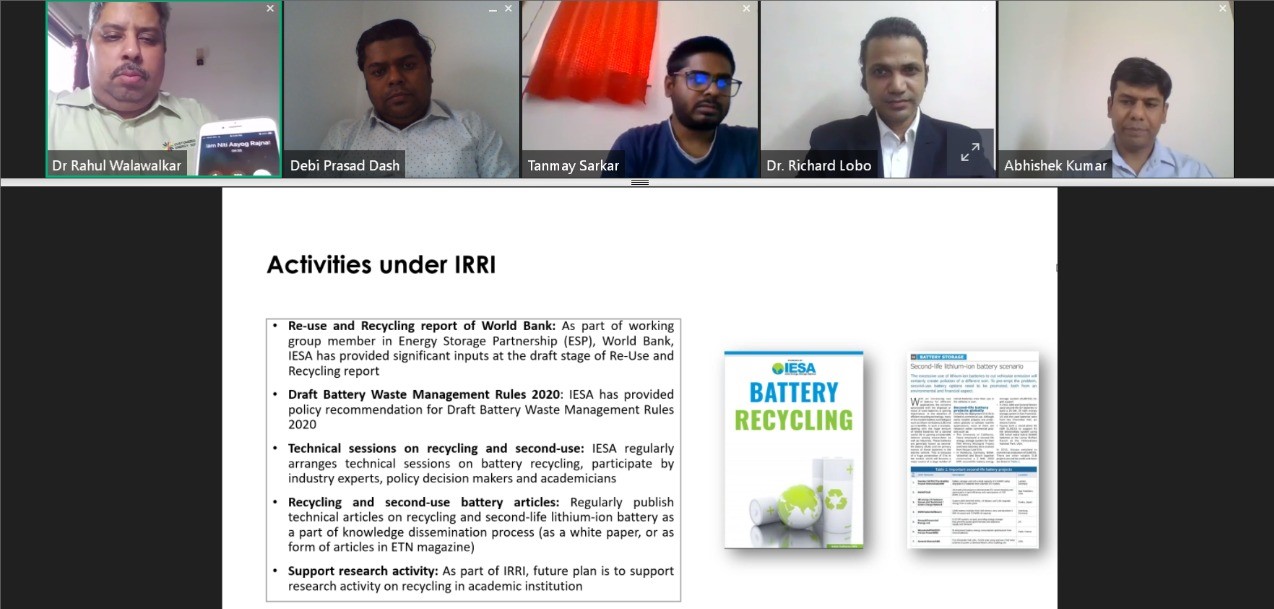IESA Re-use & Recycling Initiative (IRRI)
-
Battery collection mechanism- Proper classification and segregation of batteries at centralized locations is key for enabling the recycling industry. Launching an initiative to create a collection network for used batteries.
- Encouraging Battery recycling research- As part of IESA R&D activities we will be sponsoring one postdoctoral student for research on recycling processes
-
Creating awareness for the need for recycling of batteries Commercial opportunities for ‘Urban Mining’- Commercial opportunities for ‘Urban Mining’, Regulatory support required for encouraging recycling
-
Organized a webinar on Battery Recycling on 3/10/2019 that discussed the extent of materials recovery possible from recycling, the concept of urban mining and technological advances in recycling in recent years. Speakers participated were from IIT- Madras, Fortum India and Customized Energy Solutions India
-
Released a white paper on Battery Recycling on 2nd October 2019. Link to access- https://indiaesa.info/resources/knowledge-papers/2543-iesa-battery-recycling-white-paper
-
The Ministry of Environment, Forest and Climate Change (MoEFCC) in February 2020 issued a draft notification for 'Battery Waste Management Rules, 2020', which is set to supersede Batteries (Management and Handling) Rules, 2001. Unlike the earlier rule ‘ Battery (Management and Handling) Rules, 2001’, which only covered lead-acid batteries, the new draft has proposed a blanket cover, regardless of their shape, volume, weight, material compositions etc. However, the rule does exclude a few of the battery application areas like space exploration, medical equipment, military purposes, emergency lighting and alarm system. The Draft Battery Waste Management Rules 2020 also includes a chapter on prohibitions and labelling requirements which prima facie prohibits product placement of batteries containing more than 5ppm of mercury by weight or portable batteries containing more than .002% of Cadmium by weight. Also, as per new rules, consumers are now obligated as compared to be responsible, to return their used batteries only to the dealers or deliver at the collection centre. It has also introduced the authorization requirement for producers along with an elaborate Enhanced Producer Responsibility Plan. Lastly, the rules also bring into the need for proper data collection and validating the same with GSTN portal. In this regard, the ministry sought objections or suggestions on the same from the public. Accordingly, IESA held a series of internal as well as external discussions with its 100 plus members. Based on the series of discussion, IESA consolidated suggestions/recommendations received from the member companies and submitted to the ministry vide letter dated April 9, 2020.
-
On 6th Nov 2020 at India Energy Storage Week, a dedicated session was organized on Advancement of battery technologies and recycling. Panelist from CSIR-CECRI, International Advanced Research Centre for Powder Metallurgy and New Materials (ARCI), Institute of Minerals & Material Technology (IMMT), Consortium for Battery Innovation (CBI), National University of Singapore (NUS) and Pondicherry University participated in the session.










